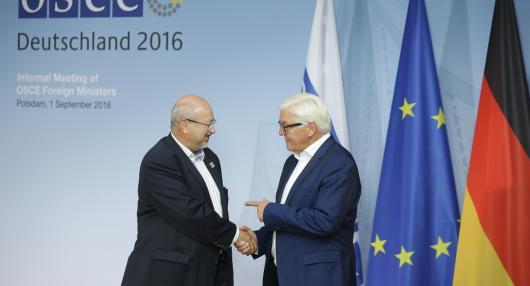
Informal OSCE ministerial meeting in Potsdam
02.09.2016 / 13:09 | Aktualizováno: 02.02.2018 / 18:55
The German OSCE Chairmanship hosted the first OSCE informal ministerial meeting in Potsdam on 1 September 2016.
“It is my firm belief that we must work together to face the common threats of our times and to make use of the OSCE more effectively as a central platform for dialogue,” said OSCE Chairperson-in-Office and German Foreign Minister Frank-Walter Steinmeier at the end of the Informal Meeting of OSCE Foreign Ministers in Potsdam today. “At a time when we are facing grave differences of opinion and a loss of trust in the Euro-Atlantic and Eurasian area, we as political leaders have a duty to listen to each other and to re-engage in genuine dialogue,” Steinmeier added.
With regard to the crisis in and around Ukraine, Steinmeier lauded the OSCE’s essential role in the Trilateral Contact Group and the committed work of the Special Monitoring Mission to Ukraine (SMM). He underlined that all sides must fully guarantee the security and safety of the SMM monitors and equipment and ensure their unfettered access throughout the country, including in the conflict area. Steinmeier welcomed the fact that the sides re-committed to full adherence to the ceasefire at the beginning of the new school year: “I expect that all sides finally live up to their commitment to respect the ceasefire permanently.”
Steinmeier also underlined that a re-launch of conventional arms control was urgently needed to adequately address today’s security challenges in a cooperative way. A new, dangerous arms race on the European continent must be prevented and a return to restraint, predictability, transparency and trust must be supported in order to reduce military risks, he added.
“The spirit of Potsdam will guide our course in preparing the forthcoming Ministerial Council in Hamburg. I count on each participating State’s sense of political ownership for our organisation,” Steinmeier said. He also stressed the importance of defining a concrete, project-oriented common agenda for the OSCE’s future. This approach should form the basis for strengthening the OSCE and its institutions as a whole.




